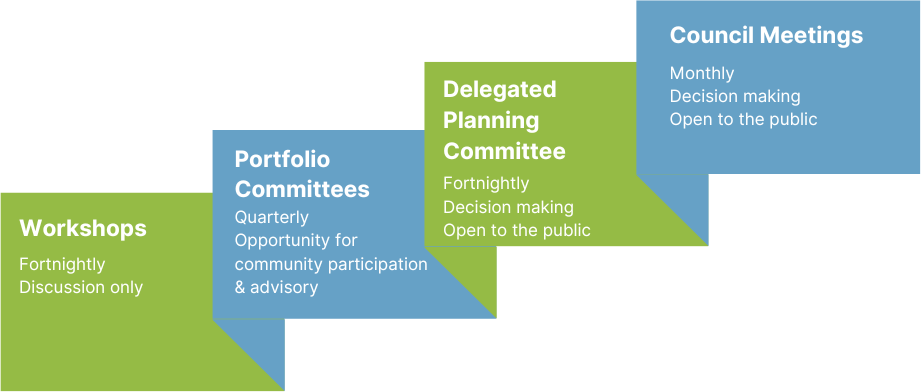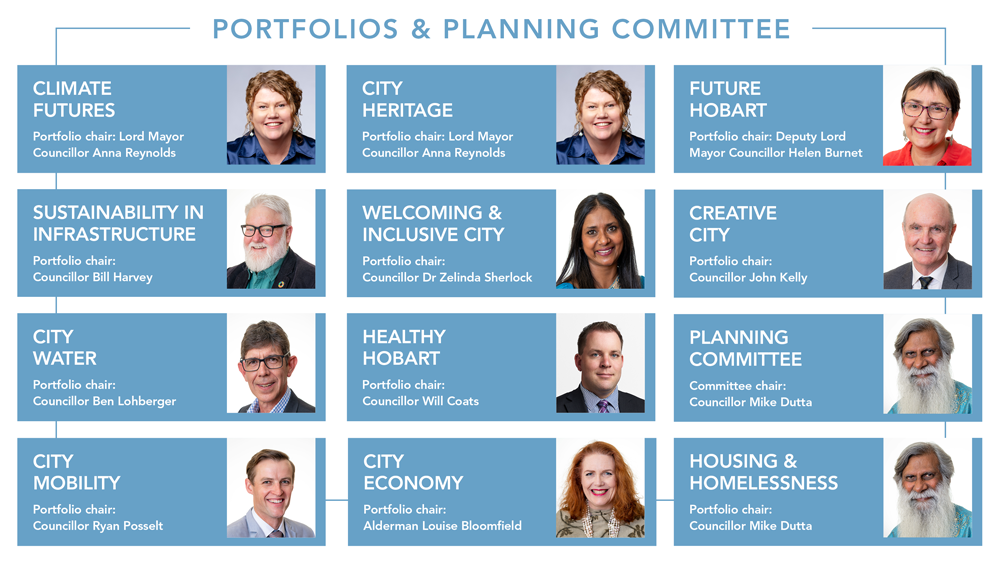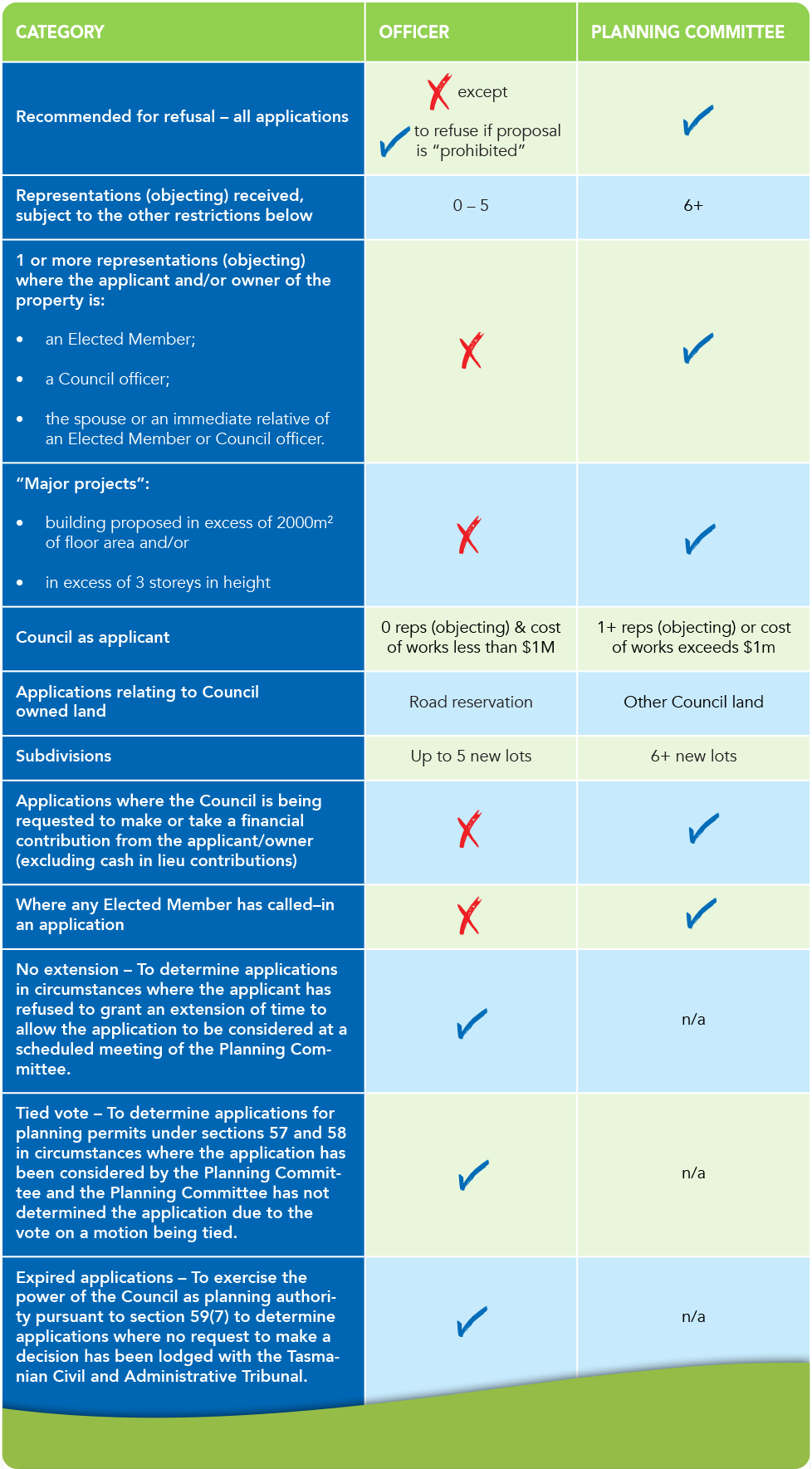Governance
Hobart is transitioning to a vibrant, globally relevant and contemporary capital city. Through a city shaping lens, the City is embracing opportunities for growth, aligned to the community vision and building state, national and international connections and capabilities to leverage all that Hobart has to offer.
As a capital city we are the engine room of the state of Tasmania and therefore have an important role to play in evidence-based planning and research underpinned by comprehensive community engagement to influence state and national policy to ensure the needs of our businesses and community are met now and into the future.
At the end of each Council term, it is best practice to undertake a comprehensive review of the model that supports the good governance of the Council. As such, a new operational model to best support Council decision making moving forward has recently been endorsed by Council.
This governance model has been developed following an analysis of best practice across Australia, with specific focus on the role of Hobart as a capital city.
The new City of Hobart Governance Model will include a move to:
- Monthly council meetings (decision making)
- Fortnightly planning committee meetings (decision making)
- Fortnightly Elected Member Workshops (non decision-making briefings)
- Quarterly Portfolio Committees (non-decision making 'advisory' committees)
Council's new Governance Framework articulates how the Council wishes to work together into the future to provide a contemporary external governance model to ensure the City is leading from the font and engaging with key stakeholders in an impactful way that delivers on Hobart's aspirations.
Governance Framework(PDF, 458KB)
FAQs
What is the governance model?
A Council governance model sets the structure for policy and strategy development as well as decision-making by Elected Members.
At its meeting on Monday 21 November 2022, Council resolved to introduce a new governance model that includes an Elected Member Portfolio system as part of its governance structure. This system provides for nominated Elected Members to be assigned specific areas of focus for policy and strategy development aligned with the Council's strategic objectives.
It's critical that Council decision-making is informed by the Capital City Strategic Plan, Council Officer advice, a sound evidence base, community consultation and engagement and underpinning legislative frameworks.
The Council is the decision-making body that sets the strategic direction and policy for the municipal area.
The Local Government Act 1993 states that in addition to any functions of a council in this or any other Act, the Council has the following functions:
- To provide for the health, safety and welfare of the community;
- To represent and promote the interests of the community; and
- To provide for the peace, order and good government of the municipal area.
The Local Government Act 1993 sets out the role and function of the Lord Mayor, Deputy Lord Mayor and Elected Members.
The Lord Mayor and Elected Members provide leadership to the community and reflect the community's collective aspirations. Central to this is the way that Elected Members are engaged in 'decision forming' and how the organisation facilitates this leading into decision making by the Council in the Chamber.
A comprehensive review of local government governance models was undertaken to understand best practice across Australia.
The review helped inform a new City of Hobart Governance Model designed to meet minimum requirements that are expected to be incorporated into the new Local Government Act following the Future of Local Government Review.

Governance Model(PNG, 48KB)
Workshops
What are workshops?
Workshops provide a place where new ideas for the City can be shaped and formed with input from elected members, officers and relevant stakeholders or subject matter experts.
Matters for consideration will usually include updates on the more significant matters due to come before a meeting of the Council, briefings on significant matters by external parties and briefings on the progress of significant Council projects, finances, strategic and plans.
The Chief Executive Officer will set the agenda for Elected Member workshops but will consider suggestions from the Lord Mayor, Deputy Lord Mayor and Elected Members.
Workshops will be held fortnightly with a written agenda and associated briefing papers. They will be timed as consistently as possible in expectation that Elected Members will endeavour to attend all such meetings unless there is a reasonable reason why they cannot do so, noting, however, that attendance is not a statutory requirement, but attendance will be recorded and published on the Council website.
The workshops will help to ensure initiatives that are later presented to council for decisions have already considered feedback from elected members and can progress to the decision-making framework.
The workshops are for discussion only. No decisions can be made in the workshops.
Why aren't the workshops streamed online for the public to see?
Workshops are an opportunity for ideas in their early stages to be discussed openly, without concern of incorrect public sentiment being generated before an idea is fully formed and considered for presentation to Council for decision in its final, fully considered form.
Are workshops informal or will minutes be recorded?
Workshops are informal however the CEO will report monthly to council on workshop outcomes, attendance and next steps. The Local Government Act 1993 requires that workshops be reported to Council.
Workshops are not decision-making forums.
There will be a standing agenda item on the monthly Council agenda for the CEO to report on workshops that have been held.
Haven't workshop style meetings been questioned in some other council jurisdictions previously? How are these different?
It is vital that workshop style meetings are never treated as decision making forums and this is what has largely brought some other Council governance processes into question.
Workshops will and must always remain as discussion only.
Won't this result in less transparency and more decision making behind closed doors?
Establishment of the policy and strategic direction of the City requires Elected Members and management to work together to deliver best possible outcomes for the community. All matters requiring Council consideration are reported and considered by Council in the public council chamber.
Workshops enable elected members to be engaged at the beginning of key City initiatives and projects rather than the previous model where they were often only presented reports in Council Meetings at the end of the process.
All decision making will still be held in public settings where the public can either attend in person or view via the City of Hobart's YouTube channel (live or via recording).
Portfolio Committees
What are Portfolio Committees?
The Council at its meeting on Monday 21 November 2022 resolved to establish Portfolio Committees made up of community members and individuals with a wealth of knowledge and experience in the area of each portfolio.
These Committees will provide support and advice on a range of strategies and policies that contribute to making Hobart a great place to live, work and play.
The Committees will support the delivery of Council's strategic objectives as described in the Capital City Strategic Plan.
Each Portfolio Committee will be chaired by the Elected Member Portfolio Chair.
Terms of Reference for each Portfolio Committee approved by the Council are below.
Terms of Reference
- Terms of Reference - City Economy Portfolio Committee(PDF, 243KB)
- Terms of Reference - City Heritage Portfolio Committee(PDF, 241KB)
- Terms of Reference - City Mobility Portfolio Committee(PDF, 243KB)
- Terms of Reference - City Water Portfolio Committee(PDF, 190KB)
- Terms of Reference - Climate Futures Portfolio Committee(PDF, 214KB)
- Terms of Reference - Creative City Portfolio Committee(PDF, 220KB)
- Terms of Reference - Future Hobart Portfolio Committee(PDF, 231KB)
- Terms of Reference - Healthy Hobart Portfolio Committee(PDF, 244KB)
- Terms of Reference - Housing and Homelessness Portfolio Committee(PDF, 244KB)
- Terms of Reference - Sustainability in Infrastructure Portfolio Committee(PDF, 220KB)
- Terms of Reference - Welcoming and Inclusive City Portfolio Committee(PDF, 244KB)
What is the role of Portfolio Committees?
The role of the Committees is to:
- Provide local area "lived experience" knowledge to support Council decision making regarding the portfolio area to support the implementation of the Hobart Community Vision and Capital City Strategic Plan.
- Provide subject matter expertise to the Portfolio Committee to further the understanding of the portfolio group.
- Advise Council on how to best engage local communities regarding the portfolio area.
- Advise Council on key local projects regarding the portfolio area identified as important by the local community and organisations through the development of the Capital City Strategic Plan.
- Facilitate communication between Council, local communities and organisations in relation to the Hobart Community Vision and Capital City Strategic Plan.
What will the Portfolio Committees be?
- City Economy
- Creative City
- Future Hobart
- Sustainability in Infrastructure
- Housing & Homelessness
- City Heritage
- City Mobility
- City Water
- Welcoming & Inclusive City
- Healthy Hobart
- Planning Committee
- Climate Futures

Portfolios and Planning Committee(PNG, 308KB)
How are Portfolio Chair's chosen?
The Portfolio chair is an Elected Member who was voted by their peers into this position at the council meeting on 21 November 2022.
As Portfolio Chairs, Elected Members have been assigned specific areas of focus for policy and strategy development aligned with the Council's strategic directions as set out in the Hobart Community Vision and Capital City Strategic Plan.
Establishment of the policy and strategic direction of the City required Elected Members and management to work together to deliver best possible outcomes for the community.
How can the public participate in portfolios?
A report will be provided to the Council in January 2023 in relation to the expression of interest process for community members to join Portfolio Committees. The Expression of Interest process for community members will commence in February. It is proposed that Portfolio Committees will be made up of community members and individuals with a wealth of knowledge and experience in the area for each portfolio.
How will the public be selected for participation in Portfolio Committees?
The public Expression of Interest process will commence in February 2023.
This will include clear selection criteria to encourage balanced representation from all demographics, cultural backgrounds and lived experienced. It is vital that community representation reflect the diversity that exists in our city.
Do any other capital cities use the portfolio structure in their governance model?
Similar models are used across Australia and by other Capital cities.
Other councils across Australia such as Moonee Ponds, Port Philip, Toowoomba, Geelong, Wyndham, Gympie, Hume, Mildura, Banana Shire, Moreton Bay, Sothern Downs and many more use similar portfolio structures in their governance model.
This is not a model unique to Hobart and knowledge from its use by other councils has been used to inform what best-practice will look like for the Hobart City Council.
Planning Committee
Will the Planning Committee meetings still be fortnightly and live streamed to the public?
Yes. The public are invited to either attend in person at Town Hall or view on the City's YouTube Channel:
City of Hobart's YouTube channel
Who can be part of the Planning Committee?
In this new governance model, all Elected Members will be part of the Planning Committee and are entitled to attend and participate in those meetings.
Alderman Simon Behrakis will be the Chair of the Planning Committee. Members of the public who have made a representation will still be able to attend meetings of the Planning Committee and make deputations to further explain their concerns, in most circumstances.
What is the main difference with planning committees in the new governance model?
The Planning Committee now has the full powers of the Council when it acts as "planning authority". Council officers will continue to be able to make decisions on certain applications, including those with up to 5 representations and those application which are proposing development on the Council's Road reservation.

Summary of Delegations(PDF, 789KB)
Previously, some planning matters were considered over multiple meetings both at the City Planning Committee and then at full Council, often leading to duplication in the debate and a delay for all parties. This new model enables all Elected Members to hear from and ask questions of planning applicants and other interested parties.
The change is aimed at delivering a more efficient assessment and deliberation process for applicants, representors, and Elected Members.
The new Planning Committee will meet every second Wednesday night, commencing on 30 November 2022. There will be a short break over the Christmas / New Year period, with meetings resuming on 18 January 2023. Planning Committee meetings can also be viewed on the City of Hobart's YouTube channel.
Council Meetings
How often does the Council meet?
At its 21 November 2022 meeting, the Council endorsed a 2023 Governance Calendar. In accordance with the calendar, Council meetings will be held once a month.
A copy of the 2023 Governance Calendar can be found on the meeting schedule for Council and Committee meetings page.
Open and Closed Portions of the Meetings
Council and the new Planning Committee meetings are open to the public, except when the meeting is dealing with matters listed in regulation 15 of the Local Government (Meeting Procedures) Regulations 2015. Those matters include personnel matters, commercial information delating with property and the award of tenders.
It requires an absolute majority of the Council or Planning Committee to close the meeting and generally consideration of items in open meetings is preferred in recognition of promoting transparency in decision making.
Can questions without notice still be asked in meetings?
In accordance with the Local Government (Meeting Procedures) Regulations 2015, questions without notice can be asked at all meetings.
Questions can be asked either;
- of the chairperson; or
- through the chairperson, of a portfolio
- to another councillor; or
- to the general manager.
Questions without notice is a standing agenda item at all meetings.
Is the new Governance model legal under the Local Government Act?
Yes, the governance model is legal under the Act; and in fact most Tasmanian and mainland councils hold workshops to enable elected members to be fully briefed on matters to impart information and allow for discussion. It has been a long-standing practice for the City of Hobart to conduct workshops (over many years) hence the decision to include workshops now as a standing item on the Council Agenda.
Is the Hobart City Council the only council to use a governance model like this?
No, the City of Hobart's new governance model has been informed by best practice across Australia and aligns with the objectives set out in the future of the local government review; and enables elected members to more effectively engage in the early stages of policy development and in driving the strategic direction of the City of Hobart.